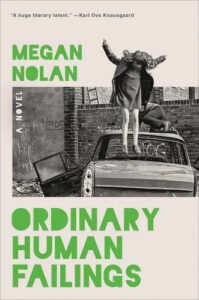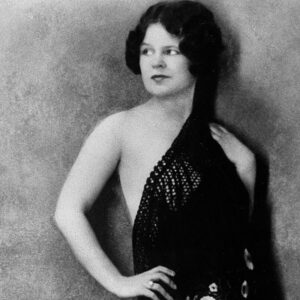I grew up reading a combination of crime (both true and fictional), horror, and satisfyingly dense, meaty literary fiction about families by the likes of Dickens, Jonathan Franzen and Elizabeth Jane Howard. In some ways, though stylistically divergent, I feel that all these genres fed a similar impulse in me, which was to challenge the apparent impossibility of comprehending the mind of another. The early, salacious true crime books about serial killers which I devoured in private as an adolescent were infinitely compelling because they revealed instincts and desires which were so far removed from my own as to be not just ghastly but instructive also, insofar as they warned me how little could be assumed about the interiority of those around me. The family narratives I so loved achieved something similar in that they opened up a network of dynamics which almost by definitional necessity is private—part of the deal with a nuclear family as we tend to know it is that the family is a hidden system which outsiders can’t be a part of or witness in totality.
The books I am recommending here combine the best of crime writing with the most reflective and thoughtful expositions of family dynamics. In my own sophomore novel, Ordinary Human Failings, I have tried to emulate them by using the framework of a dreadful crime to look deeply into one family’s private lives; after a ten year old girl, Lucy Green, is suspected of murdering a toddler on her London housing estate in 1990, an ambitious young tabloid hack senses a scoop and sequesters the troubled Green family in a hotel, plying them with booze and trying to unlock their secrets. What we find is not the stereotypical sensationalized narrative he hopes for but rather the endlessly complex reality of intergenerational trauma, shame, repression, secrets—as well as love, grief and hope.
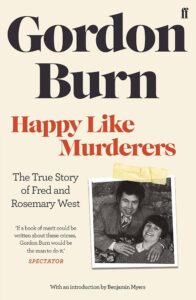
Happy Like Murderers by Gordon Burn
This is in a sense a difficult book to recommend. Unquestionably one of the more incisive, brilliantly written and sensitive works of crime non-fiction I have ever come across, it is also so upsetting and appalling that it leaves you feeling you have learned some unfamiliar, crucial truths but in doing so have had your spirit degraded. Burn writes about the notorious British serial killing couple Fred and Rosemary West, who perpetuated rape, torture, kidnapping and murder upon members of their own family and strangers. Written to be as un-sensational as possible under the circumstances, nevertheless the sheer scale and depth of the couple’s depravity is chastening for the reader, not least because of what it suggests about a society which produced people capable of such deeds. The same society was then able to ignore their wickedness for decades, missing many opportunities to halt it. What marks Happy Like Murderers out for me as a work of true genius is that it upends the secrecy of the family unit and questions the wisdom of allowing ourselves to turn away from others with privacy as our excuse. It also looks at the world of brutal poverty and sexual abuse both Fred and Rose emerged from themselves, viciousness begetting viciousness. This is an almost haunted feeling work, but one which easily holds its own alongside The Executioner’s Song and In Cold Blood as a work of exceptional literary and journalistic merit.

Small Mercies by Dennis Lehane
I went through a slightly manic phase of reading all of Dennis Lehane’s novels last year and was amazed at how many of them are relentlessly excellent. I could write for years about his body of work, but found something especially moving about his most recent stand alone novel Small Mercies, which follows tough Irish Southie broad Mary Pat into an increasingly malevolent 1970’s Boston to find her missing and much loved seventeen year old daughter Jules. This is the era of busing protests, and even as Mary Pat is driven half mad by her desperation and fury about Jules’ disappearance, she is unable to ignore the poisonous prejudice and hatred that pervades her world. This is no glib morality tale of a white woman reckoning neatly with racism; her own intolerances are not the least of those she has to confront. Lehane is always able to write efficient, inventive page turners but where Small Mercies sets itself apart is its unsparing but not unsympathetic portrait of Mary Pat, the dissolution of her family, and what becomes of a person once they lose everything they have to lose.
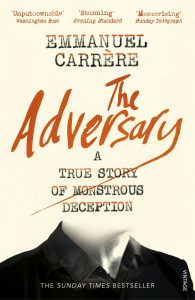
The Adversary: A True Story of Monstrous Deception by Emmanuel Carrere
French writer Emmanuel Carrere also writes unsettling, slender works of fiction like Class Trip (in which a young boy’s school trip is disjointed by the strange behavior of his father and the disappearance of a local child), but this work of nonfiction is his masterpiece. Jean-Claude Romand, a doctor for the World Health Organisation, survived a fire in 1993 which killed his wife and children. Soon afterwards, his parents are discovered shot to death at their home. Romand’s story begins to unravel and soon it becomes clear that not only had Romand killed his entire family, but that his preceding life had been nothing but elaborate and carefully defended fantasy. He had never graduated from college, fabricating a long career which had never begun, and maintained the lie through borrowing money and receiving investments from family and friends. When they begin to call back in their capital and his facade is at threat of discovery, he feels he has no choice but to kill his family.
It’s an extraordinary enough story from the bare facts, but Carrere’s precise and spare prose and reflexive self-inquiry elevate it to a work of real genius. In direct response to Capote omitting his own participation in the events he recounts in In Cold Blood, Carrere inserts his own communications and perspectives and his disquiet upon learning the details of the tragedy. For me, as well as the initial tragedy of so many innocent lives being taken, the notion of never allowing yourself to be truly seen by those closest to you for a single moment is a haunting one. I often think of a detail Carrere recounts about how Romand would spend his time: driving off to “work” in the morning and then sitting in a car park idling, checking the newspapers, staring into space, the banality and the waste of life.
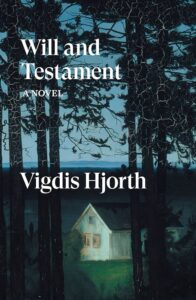
Will and Testament by Vigdis Hjorth
Like her countryman Karl Ove Knausgaard, Vigdis Hjorth wrote a literary sensation which drew her a good deal of real-life familial discord and public controversy. Bergljot, the book’s narrator, has long since been estranged from her parents and siblings, but is reluctantly drawn back to them when a dispute breaks out about the inheritance of summer houses following her father’s death. She wishes to make no claim upon the properties, but with battling relatives imploring her to take their side and settle the dispute, is forced to engage once more with a family she has cut out for her own survival and sanity. The abuse, ignored allegations and cloying manipulation of 23 years that broke them apart come to the fore, and this time must be dealt with for good. Hjorth is one of the great stylists of her time, and employs a kind of immaculate restraint which invites comparison to Ibsen. Her style is never better used than here in Will and Testament, where its reserve and precision serve to mimic the effects of familial trauma and abuse.

Night Of The Hunter by Davis Grubb
Though the film adaptation starring Robert Mitchum is justly feted, the novel Night of the Hunter by Davis Grubb has been somewhat underappreciated in recent years. A shame, as it is not only a mercilessly tight thriller but also a moving portrait of sibling bonds and the world children occupy which they cannot share with adults no matter how they may try. Based partially on the real serial killer Harry Power who lured his victims through lonely hearts advertisements and killed a widow and her two children, Night of The Hunter tells the story of the chilling ex-con Preacher who tricks the Willa Harper, the widow of his former cellmate into marrying him, chasing a large sum of money the now-dead cellmate had concealed with his family. He fools everyone except Harper’s son who sees the true darkness behind Preacher’s bombastic piety. A classic gothic chase story on one hand, it’s equally as astute on the difficulty of communicating freely within a fractured family.
***


